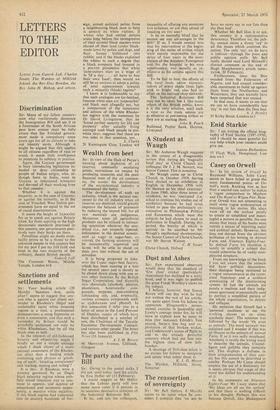Sanctions and settlements
Sir: Your leading article (20 March) 'Sanction first, settle after?' seems to suggest that any- one who is against our abject sur- render to Rhodesia's illegal and undeniably racist white minority regime is a fool, a professional demonstrator, a smug hypocrite or even a communist; and that such a surrender by Britain would be gratefully acclaimed not only by white Rhodesians, but by all the black ones as well.
In the interests of old-fashioned honesty and objectivity, might I briefly set out a simple analogy which I think allows of a more rational assessment of the Rhodes- ian affair than a leading article containing such phrases as 'gnash- ing of teeth', 'bleeding consciences' and 'wailing, ranting and railing"?
It is this: if Rhodesia were a country governed by an illegal black minority regime whose pub- licly stated intention was to con- tinue to oppress, and deprive of educational and economic oppor- tunity, a massive white majority;
• if this black regime had welcomed into its country hundreds of for- eign, armed political police from a neighbouring black state to help it control its white victims; if whites who had settled certain areas long before the immigration of their current black masters were chased off their land (under black- made laws) by police and dogs, and their homes bulldozed into rubble; and if the blacks exploited the whites to such a degree that a black company had boasted in a pre-uot prospectus that white 'cane-cutters start on a wage of 3s 7d a day . . . all have to buy their own food'; then would we still be so anxious to adopt a policy of total appeasement towards such a minority (black) regime?
know it is fashionable to say that such analogies are far-fetched, because white men are 'responsible' and black men allegedly not, but a comparison of the statements and actions of the white Rhodes- ian regime with the statement by Dr David Livingstone, that he 'found perfect security for life and property' after actually living amongst such black people in pre. white days, suggests that there are Iwo sides to that question, too.
L. Clarke 26 Kensington Gate, London w8










































 Previous page
Previous page